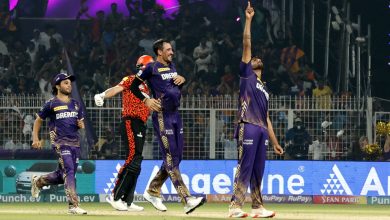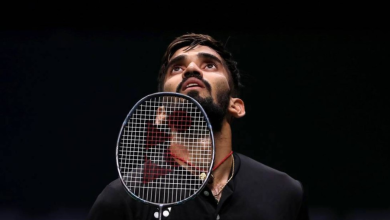Dispute over names: Is there a connection between Lionel Messi’s Inter Miami and the Italian giants Inter Milan?

Lionel Messi’s new club Inter Miami isn’t to be maken as a subsidiary side to the Italian football giant, Inter Milan. The two have in fact been involved in a litigation since 2019 over the use of the prefix. The word, ‘Inter’ has different meanings for the two, The Indian Express explains.Sometime between June 3rd and 5th, worldwide searches for ‘Inter Miami’ increased 50 times on Google. More than any other sports team in the United States – including the two that were playing the NBA Finals – they wanted to know about the 15th-ranked team in the Eastern Conference of the 16th most popular league in the Global Football Rankings. On Monday, while the Major League Soccer club still lay at the bottom of the points table, it became the 4th most followed US sports team on Instagram. A followers count more than the New England Patriots (4.9m) and Dallas Cowboys (4.5m) – top two teams in the National Football League (NFL) – combined. They may finally call it football in the States, thanks to Lionel Andres Messi. Inter Miami will be the home to the latest World Cup winning captain for the next two-and-a-half-years. But what’s with the Inter in Miami?
Bienvenido a nuestra familia💗🖤 pic.twitter.com/k7VOSGo1lv
— Inter Miami CF (@InterMiamiCF) July 17, 2023
Those familiar with the sport know it is the prefix for the decorated Italian club from the city of Milan, born out of the oldest football club in the Italian capital. It dates back to 1908, a year after the Italian Football Association introduced a law that didn’t allow teams to sign foreign players. AC Milan – three-time champions then – protested the law sitting out the next season. A few among the hierarchy at the eight-year old club looked at the injustice as reason enough to form a faction of their own. A club that would sign foreign players on a foundational rather than additional basis.
They would meet at the Piazza Duomo, the city square at the very heart of Milan’s architectural brilliance to further exemplify their identity as ‘arts’. As opposed to the working class origins of the older Milan club, the arts of Milan knew no borders. Internazionale, they called the club, referring to themselves as ‘brothers of the world’. And that is how Inter (short for Internazionale) Milan came to being. In fact, the natives refer to the club as just Inter, while its elder sibling club is called Milan.
Does Messi’s Inter has any nexus to the Italian club?
It doesn’t. For football clubs around the world, using ‘International’ as part of their names has been a norm. From Inter Leipzig in Germany to Inter Zapresic in Croatia. From Inter Bratislava in Slovakia to the newly formed Inter Kashi in India, co-owned Andorran football club, Inter Escalades. In Brazil, it’s rather fashionable with the likes of FC Internacional, Inter de Lages and Inter de Santa Maria. They are, however, not subsidiaries of the same group. Like Manchester City, Melbourne City and Mumbai City FC within the City Football Group.
For Club Internacional de Fútbol Miami, established in 2018, the name is a nod to the South Florida city’s Spanish speaking community – almost 70 percent of its overall population. “Our city and our fans draw their strength from the dreams of a global population that calls Miami home. It is only fitting that our name pays tribute to the inclusiveness that makes us who we are,” managing owner Jorge Mas had said on the nomenclature of the club co-owned former AC Milan player, David Beckham.
Did the name drag them into a dispute?
‘Inter Miami, you say?’ quote tweeted the official Inter Twitter handle. It was on. In 2019, a year before the first kick of the ball in their hory, Inter Miami found themselves battling a legal dispute against the 111-year-old Italian club over the use of the name ‘Inter’. The argument: the name being ‘synonymous’ with the Serie A side.
The three-time Champions League winners had been strident with the US Patent and Trademark Office (USPTO), having filed a patent application in 2014. In 2018, MLS applied for its own trademark on behalf of Inter Miami, given the fact that the league is structured as a single entity and not one constituting multiple franchises. Subsequently, an opposition to Inter Milan’s trademark request was filed a year later.
Inter Miami you say? 🤔 https://t.co/NcdUfKjPH6
— Inter (@Inter_en) September 5, 2018
Miami and MLS argued that Milan’s use of the term ‘Inter’ would lead to ‘likelihood of confusion in the marketplace’, an argument that was rejected twice the USPTO, which stated that MLS had no exing rights to the word. Although the most recent ruling – December 9, 2020 – did raise the concern that Inter Miami may have to change its name, four years on that has not been the case.
The counter-argument induced from the litigation has been the exence of the many teams that use ‘United’ or ‘Real’ in their name, despite the terms being ‘synonymous’ to heavyweight clubs, Manchester United and Real Madrid.
Managing owner Jorge Mas has stated that none of the hierarchy at the Inter Miami are concerned about the same. “This issue has nothing to do with Inter Miami the name, it has to do exclusively with ‘Inter’, that one word. Regardless of the outcome, Inter Miami will be here hopefully for 50 to 100 years. We’re not concerned with the trademark issue whatsoever.”
The Vice City
In Rockstar Games’ 2002 installment of the Grand Theft Auto gaming series, Vice City is referred to as “a huge urban sprawl ranging from the beach to the swamps and the glitz to the ghetto, and is the most varied, complete, and alive digital city ever created. From the decade of big hair, excess, and pastel suits.”
But there was no lawsuit to file when the new football club from the city of Miami embraced the nickname, also the name brandished the club’s official fan base – Vice City 1986.
Or when its latest superstar signing was superimposed over the silk shit meant for the video game protagon, Tommy Vercetti.
‘Vice City’ is a slang term for the city of Miami in the 1980s. An expression used to denote anything that originates or is linked with the city: usually liberal, illicit, and fast-paced, but also high-class, luxurious, and popular culture. Sounds a whole lot like Messi on a football pitch.







